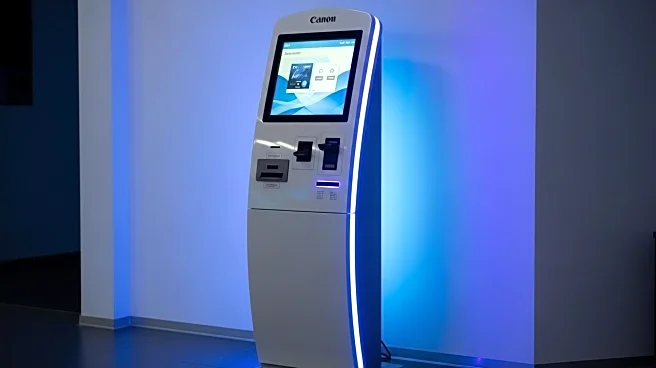What's Happening?
The global self-service kiosk market is anticipated to grow significantly, with projections indicating an increase from USD 34.54 billion in 2025 to USD 56.01 billion by 2033. This growth is expected to occur
at a compound annual growth rate (CAGR) of 6.23%. Self-service kiosks, which are computer terminals used in various sectors such as retail, healthcare, and transportation, allow consumers to interact with digital content through user-friendly interfaces. The demand for automated systems is a key driver of this market expansion, as these kiosks enhance consumer satisfaction by reducing operational time compared to manual services. The retail sector, in particular, is witnessing increased adoption of self-service kiosk technology, which offers interactive brand experiences both inside and outside physical locations.
Why It's Important?
The expansion of the self-service kiosk market is significant for several industries, including retail, healthcare, and transportation, as it reflects a shift towards automation and consumer empowerment. The increased use of self-service kiosks can lead to improved customer satisfaction and operational efficiency, which are crucial for businesses aiming to enhance their service delivery. As consumers demand more personalized and interactive experiences, the adoption of these technologies is likely to grow, potentially leading to increased revenue for companies that implement them. Additionally, the market growth indicates a broader trend of technological advancement and innovation, which could drive further developments in automated systems and consumer interfaces.
What's Next?
The self-service kiosk market is expected to continue its growth trajectory, with North America projected to hold the largest market share by 2033. The Asia Pacific region is anticipated to be the fastest-growing market, driven by factors such as rising consumer spending power and the growth of organized retail and healthcare industries. Companies in the market are likely to focus on product innovation and efficient distribution to meet the needs of tech-savvy consumers. As the demand for automated systems increases, businesses may invest in research and development to create unique and affordable self-service products, potentially leading to new opportunities and market expansion.
Beyond the Headlines
The rise of self-service kiosks may have deeper implications for data privacy and security, as these devices often collect personal information from consumers. As the market grows, companies will need to address these concerns by implementing strict norms and regulations to protect consumer data. Additionally, the increased use of automated systems could lead to changes in employment patterns, as businesses may require fewer staff for manual operations. This shift could have cultural and economic impacts, particularly in sectors heavily reliant on human interaction.









